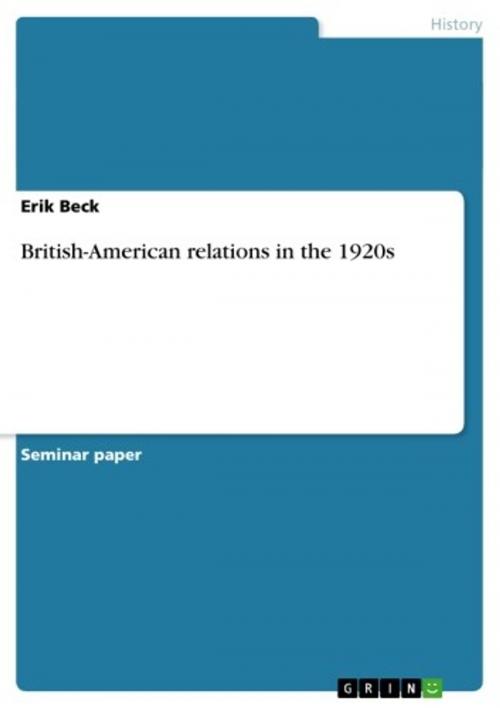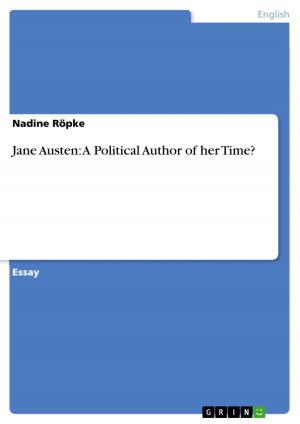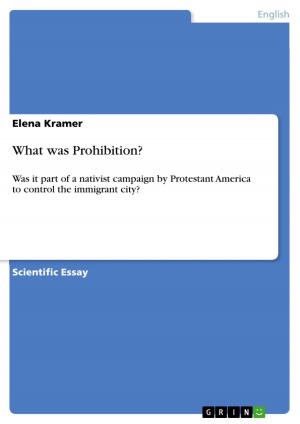| Author: | Erik Beck | ISBN: | 9783638130332 |
| Publisher: | GRIN Publishing | Publication: | June 16, 2002 |
| Imprint: | GRIN Publishing | Language: | English |
| Author: | Erik Beck |
| ISBN: | 9783638130332 |
| Publisher: | GRIN Publishing |
| Publication: | June 16, 2002 |
| Imprint: | GRIN Publishing |
| Language: | English |
Seminar paper from the year 2002 in the subject History Europe - Germany - World War I, Weimar Republic, grade: 1 (A), University of Glasgow (Modern History), course: British Foreign Policy, 31 entries in the bibliography, language: English, abstract: I) Introduction: Answering the above question one must look back to the First World War. Various scholars have shown that the origins of tensions in Anglo-American relations derive mostly from problems centred on issues of the Great War. Therefore research on this topic must start slightly before the time frame given by the above question with the examination of the time period following the First World War (1918-1920). Since various issues influenced the decline of Anglo-American relations an essay on this topic should reasonably be arranged into the examination of different issues, rather than in a chronological way. Factors that entailed the decline in Anglo-American relations in the post-war period were the loss of influence and power of Great Britain, related to the financial dependency on the United States, Anglo-American rivalry for naval predominance, Anglo-American rivalry concerning the world's oil and rubber resources , the war debt issue and the future of the Anglo-Japanese Alliance. Thomas Buckley has shown that a deep suspicion of Britain existed within the American population and even within the American government. He stated that the predominant view on Britain was that of an arrogant competitor 'whose pretensions of leadership failed to recognise realities of British decline and American rise.' He reminded the community of Historians of how deep-rooted this suspicion was in the United States of the 1920s and 1930s. The suspicions grew on the belief that Britain worked only for its own interests and therefore always against the United States whose influence increased steadily. A large number of Americans believed that Britain had manipulated the United States into the war to save its very own interests. On the other side of the Atlantic similar resentments dominated the 1920s. British officials and media-representatives pointed out regularly the American strictness on the war debt issue and the danger of loosing the world-leadership. The British Ambassador to Washington wrote in 1921: 'The central ambition of this realist school of American politicians is to win for America the position of leading nation in the world and also of leader among the English-speaking nations. To do this they intend to have the strongest navy and the largest mercantile marine. They intend also to prevent us from paying our debt by sending goods to America and they look for the opportunity to treat us as a vassal state so long as the debt remains unpaid.' [...]
Seminar paper from the year 2002 in the subject History Europe - Germany - World War I, Weimar Republic, grade: 1 (A), University of Glasgow (Modern History), course: British Foreign Policy, 31 entries in the bibliography, language: English, abstract: I) Introduction: Answering the above question one must look back to the First World War. Various scholars have shown that the origins of tensions in Anglo-American relations derive mostly from problems centred on issues of the Great War. Therefore research on this topic must start slightly before the time frame given by the above question with the examination of the time period following the First World War (1918-1920). Since various issues influenced the decline of Anglo-American relations an essay on this topic should reasonably be arranged into the examination of different issues, rather than in a chronological way. Factors that entailed the decline in Anglo-American relations in the post-war period were the loss of influence and power of Great Britain, related to the financial dependency on the United States, Anglo-American rivalry for naval predominance, Anglo-American rivalry concerning the world's oil and rubber resources , the war debt issue and the future of the Anglo-Japanese Alliance. Thomas Buckley has shown that a deep suspicion of Britain existed within the American population and even within the American government. He stated that the predominant view on Britain was that of an arrogant competitor 'whose pretensions of leadership failed to recognise realities of British decline and American rise.' He reminded the community of Historians of how deep-rooted this suspicion was in the United States of the 1920s and 1930s. The suspicions grew on the belief that Britain worked only for its own interests and therefore always against the United States whose influence increased steadily. A large number of Americans believed that Britain had manipulated the United States into the war to save its very own interests. On the other side of the Atlantic similar resentments dominated the 1920s. British officials and media-representatives pointed out regularly the American strictness on the war debt issue and the danger of loosing the world-leadership. The British Ambassador to Washington wrote in 1921: 'The central ambition of this realist school of American politicians is to win for America the position of leading nation in the world and also of leader among the English-speaking nations. To do this they intend to have the strongest navy and the largest mercantile marine. They intend also to prevent us from paying our debt by sending goods to America and they look for the opportunity to treat us as a vassal state so long as the debt remains unpaid.' [...]















